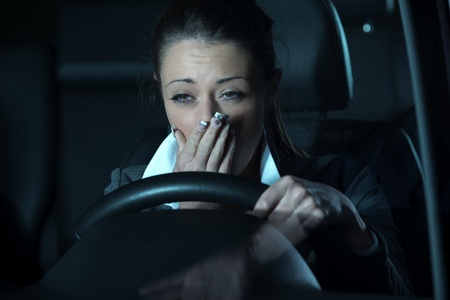Drowsy Driving is Dangerous!
March 15, 2016 | Category: Automobile Accidents, Motorcycle Accidents, Truck Accidents | ShareIn March many Americans turned their clocks forward for daylight saving time, doing so, they lose one hour’s sleep. Economics Professor, Austin Smith of Miami University’s Farmer School of Business in Miami, Ohio said, “Many Americans are sleep deprived, and when starting with chronically low levels of sleep, even a small reduction can have serious consequences.”
 The American Economic Journal is publishing a study in April 2016 in which Dr. Smith analyzed vehicle accidents just before and after daylight saving time in the United States over a ten-year period. The study shows a 6 percent increase in crashes immediately after people reset their clocks in spring, this amounted to more than 300 deaths.
The American Economic Journal is publishing a study in April 2016 in which Dr. Smith analyzed vehicle accidents just before and after daylight saving time in the United States over a ten-year period. The study shows a 6 percent increase in crashes immediately after people reset their clocks in spring, this amounted to more than 300 deaths.
In February 2015 the National Sleep Foundation updated its recommended sleep times for each stage of life. For young adults ages 18-25 and adults ages 26-64, which ages represent the majority of drivers, the foundation recommends 7 to 9 hours of sleep each night. However, the foundation estimates that more than two-thirds of American adults have a sleep-related problem and that 23 percent have actually fallen asleep while driving. With daylight saving time many will feel the effects of even less sleep.
The National Highway Traffic Safety Administration (NHTSA) estimates that driver drowsiness/fatigue was a contributing factor in 100,000 crashes annually on U.S. highways, with an annual average of 1,357 fatal crashes (3.6 percent of all fatal crashes). Almost 1,544 people are killed each year. In Florida in 2014 there were 14 fatalities in vehicle accidents because of drowsy driving.
Why would someone drive when they are sleepy?
Many sleep-deprived people erroneously believe that they can function well with only a few hours of sleep per night over a lengthy period. But sleep deprivation, even partial sleep deprivation, has significant negative effects on mental and physical performance, including driving, according to the Federal Highway Administration.
The CDC (Centers for Disease Control) reports that drowsiness:
- Makes drivers less able to pay attention to the road.
- Slows reaction time if you have to brake or steer suddenly.
- Affects a driver's ability to make good decisions.
- Drowsy driving can be just as dangerous as driving while intoxicated.
Who is more likely to drive drowsy?
In addition to drivers who do not get enough sleep in general:
- Commercial drivers who operate vehicles such as tow trucks, tractor trailers, and buses.
- Shift workers (work the night shift or long shifts).
- Drivers with untreated sleep disorders such as one where breathing repeatedly stops and starts (sleep apnea).
- Drivers who use medications that make them sleepy.
Is drowsy driving against the law?
The New York Times reported that in most states, there is no specific citation for drowsy driving, but most fall under the individual state's unsafe driving laws, reckless driving laws, or distracted driving laws.
Some states, like New Jersey, do have specific drowsy driving laws. New Jersey law says that drivers who have been awake for more than 24 hours are considered to be reckless drivers.
Thirteen states have driver’s license restrictions for motorists with untreated sleep disorders. These states include Florida, California, Connecticut, Iowa and Maine.
What can you do to prevent drowsy driving?
Drowsy driving is not always clear to the driver. Many may not realize how fatigued they actually are. They may falsely believe they may fight through the urge to fall asleep. There are some precautions a driver may take to avoid drowsy driving. Experts from the National Sleep Foundation recommend:
- Planning driving during times when you are most awake.
- Nap before a long drive.
- Ask another person to drive if you are feeling drowsy.
- Pull over, if possible and safe, at a rest stop for a few hours.
- If you consume caffeine to try to stay awake, remember the effects only last up to an hour.
“Remember with daylight savings time there will be many drowsier drivers on our roads. Contact the expert team at Spivey Law Firm, Personal Injury Attorneys, P.A. if you or a loved one is involved in an accident with a drowsy driver,” said Charlotte County Vehicle Accident Attorney, Randall Spivey.
Charlotte County Vehicle Accident Attorney, Randall L. Spivey is a Board Certified Trial Attorney – the highest recognition for competence bestowed by the Florida Bar and a distinction earned by just one (1%) percent of Florida attorneys. He has handled over 2,000 personal injury and wrongful death cases throughout Florida. For a free and confidential consultation to discuss your legal rights, contact the Spivey Law Firm, Personal Injury Attorneys, P.A., in Lee County at 239.337.7483 or toll free at 1.888.477.4839,or by email to Randall@SpiveyLaw.com. Visit SpiveyLaw.com for more information. You can contact Spivey Law Firm, Personal Injury Attorneys, P.A.in Charlotte County at 941.764.7748 and in Collier County 239.793.7748.

